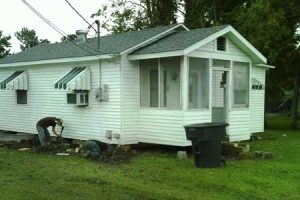We Explain how a house’s foundation can settle unevenly.
 How a house’s foundation can settle unevenly. DIY House Leveling New Orleans: Contact Ace House Leveling in New Orleans (504) 858-1974. The issues described in this blog can lead to uneven foundation settlement, which often necessitates house leveling to correct structural problems and restore stability. Here’s a brief overview of how each issue can contribute to the need for house leveling:
How a house’s foundation can settle unevenly. DIY House Leveling New Orleans: Contact Ace House Leveling in New Orleans (504) 858-1974. The issues described in this blog can lead to uneven foundation settlement, which often necessitates house leveling to correct structural problems and restore stability. Here’s a brief overview of how each issue can contribute to the need for house leveling:
A house’s foundation can settle unevenly due to several factors related to the soil, water content, construction practices, and external influences. Here’s a detailed explanation of how this can happen:
1. **Soil Type and Composition**:
- **Clay Soils**: Expansive clay soils can cause uneven settling because they swell when wet and shrink when dry. This cyclic expansion and contraction can lead to differential movement in the foundation.
- **Non-Uniform Soil**: If different parts of the foundation rest on different types of soil, such as part on bedrock and part on a softer, more compressible layer, the softer soil may compact or move more, leading to uneven settling.
2. **Moisture Content Variations**:
- **Excess Water**: Poor drainage or leaks can cause one area of the soil to become over-saturated, leading to soil compression and settlement in that area.
- **Drought**: Conversely, a lack of water can cause soils, especially clay, to dry out and contract, causing settling.
- **Uneven Moisture Levels**: If one side of the house receives more moisture or dries out faster than the other (e.g., due to slope or landscaping), it can result in differential.
We Discuss the most common causes of foundation settlement, such as poor soil conditions, expansive soil, and leaks around the foundation.
Foundation settlement refers to the gradual sinking or moving of a building’s foundation. Uneven settlement can cause significant structural issues within a home. Let’s delve into the most common causes of foundation settlement:
1. **Poor Soil Conditions**:
- **Loose or Poorly Compacted Soil**: When soil is not adequately compacted before construction, it can settle over time under the weight of the structure. This leads to foundation movement.
- **Erosion-Prone Soil**: Certain soils are more susceptible to erosion, especially if the property is on a slope. Erosion can remove supporting soil from beneath the foundation.
- **Organic Materials**: Soils that contain a lot of organic material may decompose over time, causing a decrease in volume and settlement.
2. **Expansive Soil**:
- **Clay Soil**: Some clay soils, known as expansive clays, can absorb water and expand. When they dry out, they shrink. This constant expansion and contraction can cause significant movement in a foundation.
- **Seasonal Changes**: Expansive soils often respond dramatically to seasonal changes in moisture content, leading to cycles of swelling and shrinking that can affect the stability of the foundation.
3. **Water Issues**:
- **Water **Water Issues** | **Water Leaks**: Plumbing leaks, broken sewer lines, or other water-related problems can lead to localized water saturation in the soil near the foundation. This excess water can soften the soil, reducing its load-bearing capacity and causing it to compress under the weight of the house.
- **Poor Drainage**: Inadequate drainage systems around the property can cause water to accumulate near the foundation. For example, if gutters are improperly installed or there’s no proper slope away from the house, water can pool and seep into the soil, leading to settlement issues.
- **Hydrostatic Pressure**: Accumulating water in the soil can create hydrostatic pressure against the foundation walls. Over time, this pressure can cause the soil to shift and settle unevenly.
4. **Construction Practices**:
- **Inadequate Site Preparation**: Proper site preparation is crucial for a stable foundation. If the site is not properly excavated or if fill materials are not properly compacted, it can lead to uneven settlement.
- **Substandard Foundation Construction**: Using low-quality materials or construction techniques can create a foundation that is unable to cope with expected soil movement, moisture changes, and load stresses, leading to settlement.
5. **Tree Roots**:
- **Root Infiltration**: Trees and large shrubs planted too close to a home’s foundation can cause settlement. Their roots can grow beneath the foundation and absorb moisture from the soil, causing it to contract and settle.
- **Organic Decomposition**: Over time, the roots of a dead tree will decompose, which can also create voids and lead to soil settlement issues.
6. **Natural Events**:
- **Earthquakes**: Seismic activity can cause sudden and uneven settlement of a foundation due to ground shaking and soil movement.
- **Flooding**: Significant flooding can lead to soil saturation and erosion, which can undermine a foundation and cause it to settle unevenly.
7. **Temperature Changes**:
- **Frost Heave**: In colder climates, the freezing and thawing of the ground can cause soil to expand and contract, impacting the foundation. Frost heave occurs when the soil freezes and expands, lifting the foundation. When the soil thaws, it contracts, which can lead to gaps and uneven settling.
Read More Articles:
5 Benefits of Foundation Repairs for Homeowners
